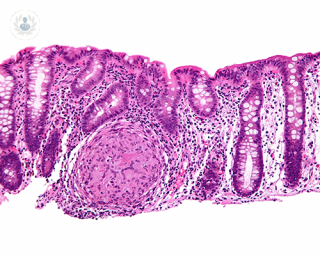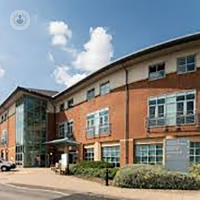Crohn's disease
Ms Kat Baker - Colorectal surgery
Created on: 06-13-2013
Updated on: 11-10-2023
Edited by: Aoife Maguire

What is Crohn’s disease?
Crohn’s disease is a type of chronic inflammatory bowel disease (IBD) that can affect any part of the digestive tract from mouth to anus, but is most commonly found at the end of the small intestine, where this meets the colon (large intestine). It is characterised by inflammation, which is often severe and can be debilitating, and may extend through the whole width of the bowel wall.
Prognosis of Crohn’s disease
Crohn’s is a chronic condition, meaning long-term. There is currently no known cure for Crohn’s disease, although existing therapies make it manageable and can cause the disease to go into remission for years at a time. Flare-ups still occur periodically, however, and can make life difficult.
Symptoms of Crohn’s disease
When Crohn’s disease is active, typical symptoms include:
- Diarrhoea
- Abdominal pain (stomach aches, etc.)
- Blood in the stool
- Fatigue
- Weight loss
- Reduced appetite
- Mouth sores
- Fever
Symptoms can range from mild to severe, and usually develop gradually, but may come on in sudden attacks.
In severe cases, Crohn’s can also affect other parts of the body, including inflammation in the joints, the liver, the skin, and the eyes.
Crohn’s can start at any age, but symptoms usually first manifest in late childhood and early adulthood, with the majority of cases being diagnosed before the age of 30.
It often occurs in flare-ups, which may go into remission with treatment, but will flare up again weeks, months, or even years later.
What are the causes of Crohn’s disease?
The causes of Crohn’s disease are currently poorly understood, but a great deal of research into the illness is being carried across the world and experts are continuing to learn a lot about its mechanisms and possible causes. The leading theories are that it is caused by a combination of some of the following factors:
- Genetics – it is thought that some people are born with genes that predispose them to the development of Crohn’s
- Autoimmune – many experts believe that Crohn’s is an autoimmune disease; that is, the immune system mistakenly attacks cells in the digestive system as if they were invading bacteria or viruses.
- Gut bacteria and antigens – it is possible that certain bacteria or the antigens they produce may trigger the autoimmune response. Another theory is that an imbalance in gut bacteria may have a more direct effect on the development of Crohn’s. Current research indicates that, whatever the mechanism, bacteria seem to be relevant.
Other risk factors that may contribute include:
- Smoking
- Previous stomach bugs
- Living in an urban environment
- Family history, i.e. relatives that also have Crohn’s
Treatments for Crohn’s disease
While Crohn’s disease cannot be cured, there are treatments to reduce and control the symptoms. Sometimes, these treatments can be enough to send the disease into periods of remission. Typical treatment options include:
- Various anti-inflammatory medication, including certain steroids. The type prescribed will depend on the patient and on the severity and location of the inflammation in the digestive system.
- Immune system suppressors may be prescribed to reduce inflammation by targeting the immune system, which makes the substances that cause inflammation.
- Surgery may be the best option – by removing part of the tissue in the digestive tract, and reconnecting the healthy sections, the inflammation can be removed. However, this does not eliminate the chances of recurrence; surgery usually offers a temporary solution in severe cases of the disease.
Which type of specialist treats Crohn’s disease?
Gastroenterologists treat all kinds of inflammatory bowel disease, including Crohn’s disease and ulcerative colitis. Colorectal surgeons are usually responsible for performing operations to treat IBD.

















